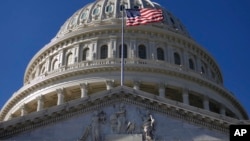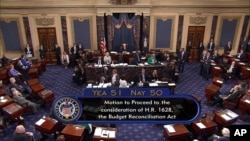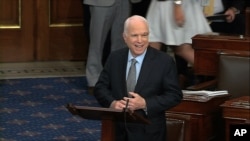The Republican-led U.S. Senate is set to vote Wednesday on a bill that would repeal former President Barack Obama's signature health care law, one day after the chamber rejected a comprehensive bill aimed to amend the law.
The latest legislation would repeal the Affordable Care Act, which has provided coverage to millions of Americans, but would not provide a replacement. Some Republicans are concerned that repealing the law without replacing it would result in the loss of health care coverage for many Americans, an approach that does not appear to have enough support.
Senate Republican leaders have also considered a so-called "skinny" bill that would repeal a few primary provisions in the current law, such as penalties imposed on people without insurance and businesses that do not provide insurance to their workers.
If lawmakers pass a bill, the nation's health care problems will not be resolved in the near future, new White House communications director Anthony Scaramucci said Wednesday on CNN.
"If you're expecting an instant panacea or an instant cure, it's not going to be provided by anybody here in Washington," Scaramucci said.
Measure rejected Tuesday
Lawmakers Tuesday rejected a measure drafted by Senate Majority Leader Mitch McConnell that would have ended the expansion of Medicaid, the program that provides health insurance for poor Americans, cut subsidies to help low-income people buy private health insurance plans, and eliminated tax penalties on people who do not buy health insurance.
The measure also included an amendment by Texas Republican Ted Cruz that would let health insurers offer less generous plans than those required under the Affordable Care Act.
Tuesday night's vote was the first of many that will be taken in the Republican Party's yearslong effort to repeal and replace the ACA, also known as Obamacare. The Senate's move to begin debate occurred after McConnell tried and failed during the past month to pass two different versions of the bill. But even that move nearly failed, as all Democrats and two Republican senators, Susan Collins and Lisa Murkowski, voting against the so-called motion to proceed, leaving the chamber deadlocked at 50-50.
It took Vice President Mike Pence, in his constitutional role as presiding officer of the Senate, to cast the tie-breaking vote.
Murkowski drew the ire of President Donald Trump in a Wednesday tweet.
A decisive vote was cast by Arizona Republican John McCain, who returned to Capitol Hill just days after being diagnosed with brain cancer. McCain received a rousing ovation from his colleagues when he strode onto the Senate floor, and they broke into applause to cheer the sometimes stern message that he delivered.
McCain calls for bipartisanship
McCain chided his colleagues for their lack of progress. He called on all senators to govern better by embracing compromise, bipartisanship and the Senate's traditional way of doing business.
"Let's trust each other. ... We've been spinning our wheels on too many important issues because we keep trying to find a way to win without help from across the aisle," he said.
Despite the warm reception for McCain by senators of both parties, Democrats slammed the Republicans' tactics on the health care issue, including a relatively small group considering legislative drafts behind closed doors without participation from Democrats.
"We have a distance to go to get where we need to be," said Cruz. "I will be happy when we get it done, accomplish what we set out, to honor our promise to repeal Obamacare and fundamentally expand consumer freedom and lower premiums for families who are struggling."
Details to determine final vote
Republicans have said the "skinny" bill, a less comprehensive version of the latest Senate measure, would have the best chance of gaining a majority vote to dismantle Obamacare. If the Senate approves a scaled-down version of the bill, a conference committee of the two houses of Congress will have to reconcile differences between the House and Senate versions.
The nonpartisan Congressional Budget Office has projected the effects of various Republican health care plans. All versions would result in millions of Americans losing health insurance coverage, but would yield budgetary savings.
Republicans are counting on those savings to help pay for tax cuts and other legislative priorities. With the party controlling the White House and both houses of Congress, the health care vote is seen as a critical test of Republicans' ability to govern.
Recent public-opinion surveys show that Americans view the existing Affordable Care Act more favorably than any of the Republicans' proposals to replace it.
In Washington, William Gallo, Richard Green and Wayne Lee contributed to this report.







